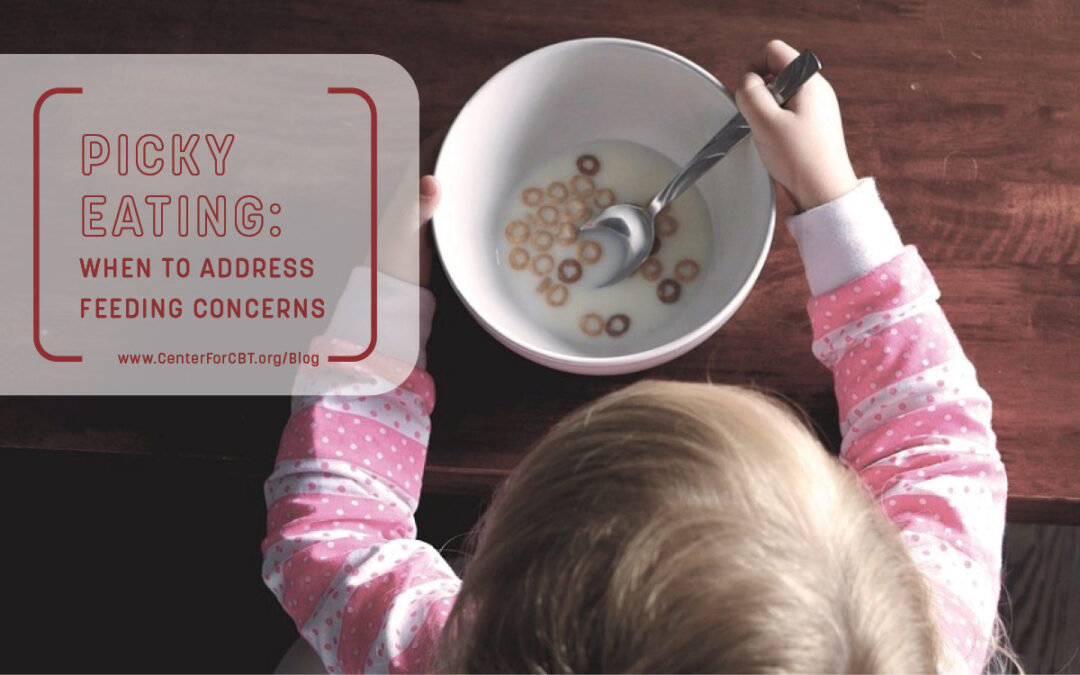For many caregivers, helping your child establish healthy eating habits can seem like a never-ending battle. Making sure your child’s diet includes a variety of selections across the five major food groups is vital to healthy growth and development in childhood. This can be particularly challenging when it comes to fruits and vegetables, often due to picky eating. Picky eating is a behavioral challenge in which a child will refuse to try new and non-preferred foods, resulting in a limited dietary variety of solid and/or liquid foods. This is a normal occurrence in childhood that can begin when introducing solid foods and can last through preadolescence, usually peaking between two to six years of age.
The Line Between Picky Eating and Feeding Disorders
Oftentimes it is expected that children will “grow out of it” as they get older. However, it is important to consider when picky eating may be developing into a feeding disorder so that caregivers can seek treatment.
Research shows that roughly 25-50% of typically developing children and 70-89% of children with developmental disabilities experience disordered feeding at some point of their life. When left untreated, a long history of poor eating habits reinforces the refusal behavior. This is why early intervention is the key to success, helping to maximize treatment gains for disordered eating. Feeding treatment assesses the problem behaviors interfering with mealtimes and works to implement evidence-based treatment procedures. This assists families in overcoming mealtime challenges.

Key Signs of a Potential Feeding Disorder
So, when is feeding treatment warranted? If you have concerns for your child’s feeding habits, there are several key signs to look out for. When multiple signs are present, you may consider consulting with a psychologist specializing in treatment of feeding disorders such as ARFID:
1. Strong food preferences. Your child may demonstrate sensitivities to food textures and/or temperatures. They may also engage in “food jags” which is when a child has a strong preference for a food, but then refuses it. Rigidity in eating routines is also a concern, and children may limit their diet by specificities pertaining to:
- Brand
- Color or shape
- Food container and/or utensil
- Meal schedule
As a result, your child may eat different meals from the rest of the family. These preferences may also interfere with their ability to consume meals outside of the home, consequently impacting socialization with peers in school and community settings.
2. Persistent avoidance and refusal of foods. Feeding related reactions may contrast your child’s normal demeanor. This may look like inappropriate mealtime tantrums, trouble remaining seated during mealtime, and behaviors such as:
- Turning of the head or covering of the mouth when food is presented
- Expelling food after bites are accepted
- Pocketing food in the mouth for an extended period of time (i.e. more than 30 seconds)
Your child may also engage in fear-based refusal. This occurs when your child experiences a traumatic choking event or allergic reaction to a food, and then limits their dietary variety in response.
3. Limited food intake. This is when your child consumes a limited volume of solids and/or liquids. They may only consume small portions of food, leading to unfinished meals. They may rely on nutritional drinks (e.g. Pediasure, Carnation Breakfast Essentials) to boost calories and avoid loss of weight.

Seeking the Right Treatment: A Team Approach
Coping with the challenges that come with a feeding disorder can be overwhelming, especially when it comes to finding a treatment that is appropriate for your child. Feeding is a complex behavior to address and may present with signs other than what is listed here. It is important to note that there are a range of other medical, nutritional, and oral-motor factors that can impact feeding as well. Know that any concerns and questions you have are valid and you are not alone. These concerns may be best addressed by a team of experienced providers such as your child’s pediatrician, a dietician, a gastroenterologist, and a psychologist specializing in feeding disorders. A combined approach is an effective way to help improve your child’s feeding behaviors and give your family the support they need.


